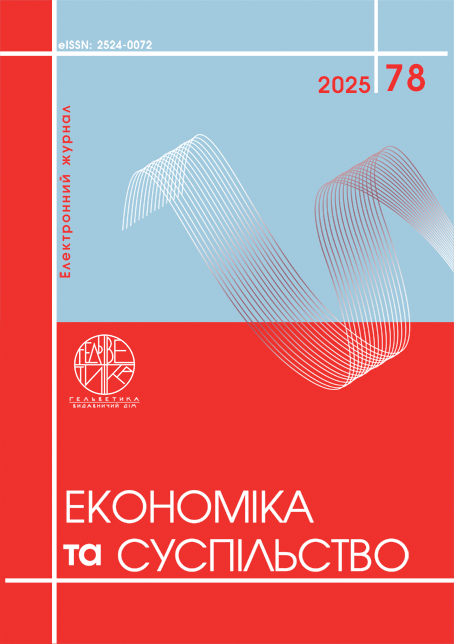BIBLIOMETRIC ANALYSIS OF RESEARCH ON SUSTAINABLE SOCIO-ECONOMIC AND ENVIRONMENTAL DEVELOPMENT
Abstract
The modern world is profoundly shaped by the accelerating processes of globalization, which manifest through structural transformations in the economy, social security systems, the environmental sphere, education, technological innovation, and nearly every aspect of social life. These multidimensional changes generate new challenges and complexities for governments and societies striving to ensure sustainable development in a context of growing interdependence between nations. Consequently, there arises an urgent need to elaborate conceptual frameworks, policy tools, and methodological approaches aimed at reforming and improving mechanisms of socio-economic regulation. Developing strategic priorities for public policy that balance economic growth, environmental protection, and social justice becomes a fundamental task for both researchers and policymakers. The main purpose of this article is to provide a comprehensive bibliometric analysis of scientific publications addressing the sustainable development of the socio-economic sector. The study relies on data retrieved from the Scopus database and covers a period of the last twenty years, allowing the identification of long-term research trends and key thematic directions. The constructed publication dynamics curve demonstrates a steady and even accelerating increase in the number of works devoted to sustainable development, confirming the growing international attention to this issue. Ensuring socio-economic security is becoming not only a certain scientific challenge but also a strategic priority for nations, countries and global institutions. According to this thematic distribution, approximately 24% of all analyzed publications are related to ecology and environmental protection. This is further confirmed by an in-depth examination of the ten most cited papers, which predominantly focus on environmental safety and sustainable industrial development. Chinese researchers hold leading positions by publication volume, which correlates with the high ranking of Chinese universities in international ratings and reflects the country’s significant economic capacity and global influence. The analysis of scientific journals revealed that over 20.96% of all identified papers were published in high-impact journals indexed in Scopus, indicating an intensive academic interest in the topic and a high level of international scientific cooperation. Using the bibliometric software tool VOSviewer, a detailed terminological and conceptual map of the research field was constructed. It enabled the identification of five main clusters of research focus, the largest of which is “sustainable development.” This cluster includes interrelated concepts such as corporate social responsibility, social justice, sustainable industrial growth, local self-government, innovation, and social responsibility. The obtained results not only reveal the dynamics of global scientific attention to sustainability issues but also provide a conceptual foundation for future policy design. They can be used to formulate new theoretical models, improve national strategies for sustainable development, and support the integration of scientific findings into practical policy decisions aimed at achieving long-term socio-economic stability and environmental balance.
References
Brundtland, G. H. Our Common Future: Report of the World Commission on Environment and Development. Oxford: Oxford University Press, 1987. 400 p.
United Nations. Transforming our world: the 2030 Agenda for Sustainable Development. New York: UN, 2015. 41 p.
World Bank. World Development Indicators 2023. Washington, DC: World Bank, 2023. 456 p.
Bennett, A.; Schork, W. Studies toward a sustainable agriculture in northern Ghana: an internal working paper on agro-ecosystems. 1979.
Riahi, K.; van Vuuren, D. P.; Kriegler, E.; et al. The Shared Socioeconomic Pathways and their energy, land use, and greenhouse gas emissions implications: An overview. Global Environmental Change. 2017. № 42. P. 153–168.
Spaiser, V.; Ranganathan, S.; Swain, R. B.; Sumpter, D. J. Modelling sustainable development pathways. International Journal of Sustainable Development & World Ecology. 2017. Vol. 24(6). P. 481–495.
Joselin Herbert, G. M.; Iniyan, S.; Sreevalsan, E.; Rajapandian, S. A review of wind energy technologies. Renewable and Sustainable Energy Reviews. 2007. Vol. 11(6). P. 1117–1145.
Jarraud, M.; Steiner, A. Managing the Risks of Extreme Events and Disasters to Advance Climate Change Adaptation. Cambridge: Cambridge University Press, 2012. 582 p.
Oyedepo, S. O. Efficient energy utilization as a tool for sustainable development in Nigeria. Energy, Sustainability and Society. 2012. Vol. 2(1). P. 15–28.
Sen, S.; Ganguly, S. Opportunities, barriers and issues with renewable energy development – A discussion. Renewable and Sustainable Energy Reviews. 2017. Vol. 69. P. 1170–1181.
Surendra, K. C.; et al. Biogas as a sustainable energy source for developing countries: Opportunities and challenges. Renewable and Sustainable Energy Reviews. 2014. Vol. 31. P. 846–859.
Vanegas Cantarero, M. M. Of renewable energy, energy democracy, and sustainable development: A roadmap to accelerate the energy transition. Energy Research & Social Science. 2020. Vol. 70. P. 101–114.
Wang, J.; et al. Land use change and its driving forces in China during 1980–2015. Land Use Policy. 2018. Vol. 74. P. 14–26.
Yu, J.; Zhou, K.; Yang, S. Land use and sustainable urban development in China: Issues and challenges. Land Use Policy. 2019. Vol. 81. P. 274–281.

This work is licensed under a Creative Commons Attribution 4.0 International License.


